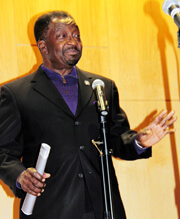After being instrumental in naming Nov. 30 as Shirley Chisholm Day, Brooklyn Assemblyman Nick Perry now wants a scholarship in all City University of New York (CUNY) colleges to be named in honor of the late Brooklyn congresswoman.
“I want to challenge our women today to help me achieve a dream I have. I think Shirley Chisholm’s work is so important, and I don’t think we’ve done enough to establish her as an icon in New York,” Perry, representative for the 58th Assembly District in Brooklyn, told a VIP Reception and Honor Ceremony for five Black women justices at Medgar Evers College in Brooklyn.
“I think we should be forceful to raise enough money to effectuate a perpetual scholarship in Shirley Chisholm’s name,” added Perry at the ceremony, organized by the Brooklyn-based Black Women for Fairness, Equity & Justice, spearheaded by former New York City Councilwoman Jamaican-born Dr. Una Clarke, in collaboration with the Caribbean Research Center at Medgar Evers College.
“My dream is to have a Shirley Chisholm scholarship in all the CUNY colleges” continued the assemblyman, noting that the annual tuition at CUNY colleges is, on average, $6,000. “We should be able to raise enough money at no cost to the student.
“And do you think it’s too much for our community to achieve,” he asked rhetorically. “We raise money for a lot of things. Not only will we be able to celebrate Shirley Chisholm’s achievements, but we’ll be opening the doors for successes.”
The honor ceremony was the culmination of the day-long 3rd Annual Shirley Chisholm Women’s Empowerment Conference, organized by Clarke’s group.
Brooklyn Congresswoman Yvette D. Clarke honored the five outstanding black women judges in concluding the all-day event.
Clarke’s mother, Dr. Clarke, presented the Congressional citations on behalf of the congresswoman to Justices L. Priscilla Hall, Sylvia Hinds-Radix, Sylvia G. Ash, Cheryl E. Chambers and Sharen D. Hudson.
Chisholm (Nov. 30, 1924 – Jan. 1, 2005), whose mother was Barbadian, father Guyanese and husband Jamaican, was an educator, author and politician.
First elected in 1968 as the first African-American woman elected to Congress, Chisholm represented the 12th Congressional District in Brooklyn for seven terms until 1983.
On Jan. 25, 1972, she became the first major party black candidate for President of the United States and the first woman to run for the Democratic presidential nomination.
Perry also commended Clarke for her “unrelenting commitment to empower women, adding in jest: “If you have strong women, you don’t have to do anything – just show up and look good.”
Earlier, Congresswoman Clarke fervently appealed to the New York State Legislature to continue the allocation of resources for residents of Central Brooklyn and other parts of the state who currently lack representatives in either chamber, saying the continued denial is clearly taxation without representation.
“I look today, in the State of New York, right here in Brooklyn; we have communities not represented in the State Legislature – Brownsville, Crown Heights, Canarsie…,” Clarke, representative for the 9th Congressional District in Brooklyn, told the conference.
“We need to be angry about this – taxation without representation,” she added. “What price for democracy? When is it too expensive to have representation?
“This is not a partisan issue,” she continued. “I’m talking about the principle here, because if we allow this to go on, those communities will not have representation until Jan. 1 (next year). I bring this to your consciousness because our work is never done.”
The congresswoman said there are 700,000 Brooklyn residents (and 1.3 million around New York State) whose representative in the State Assembly or the State Senate has resigned or been removed from office.
In Brooklyn, she identified them as State Assembly districts 54 (Bushwick and Cypress Hills); 55 (Brownsville and Ocean Hill); 59 (Canarsie, Marine Park, Mill Basin and Gerritsen Beach); and 60 (East New York).
Clarke said the 20th State Senate district (Crown Heights, Brownsville, Prospect Heights, Park Slope and Sunset Park) is also unrepresented.
She said since Gov. Andrew Cuomo has “refused to schedule special elections, residents of these neighborhoods will not have an elected representative until Jan. 1, 2015 – several months after the budget for 2015 has been finalized and other matters of importance have been decided.
“The refusal to schedule special elections has effectively denied hundreds of thousands of people in Brooklyn – primarily people of color – of a voice in the government of New York State,” declared Clarke.



























